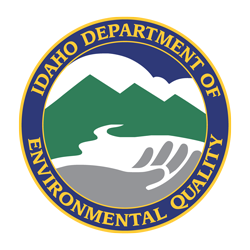September 30, 2022
Contacts:
- Dan McCracken, Coeur d’Alene Regional Administrator, Idaho Department of Environmental Quality, Dan.McCracken@deq.idaho.gov
- Scott Fields, Water Resources Program Manager, Coeur d’Alene Tribe, SFields@cdatribe-nsn.gov
BOISE — Certain water quality trends are improving in North Idaho’s iconic water body, according to the National Academy of Sciences’ (NAS) Future of Water Quality in Coeur d’Alene Lake report.
The report, which was released today, analyzes current and historic water quality data and provides recommendations to preserve the health of the lake.
“I am pleased to see positive water quality trends in Coeur d’Alene Lake. Thanks to the diligent research of the National Academy of Sciences, we are better informed about the work we are doing in Idaho. This data will allow DEQ to strategically implement the $20 million from the Leading Idaho initiative alongside our partners. I appreciate the engagement of the Coeur d’Alene Tribe and Kootenai County. We can continue these positive trends if we all work together,” said Governor Brad Little.
“I think we have seen renewed vigor in the region’s collective desire to protect Coeur d’Alene Lake,” said Chairman Chief Allan. “This is exciting because although we know that the lake has been the heart of the Coeur d’Alene people for thousands of years, we also recognize its importance to the entire region. It is critical to the Tribe that we use this NAS report as a starting point that leads to more actions,” he added.
In 2020, the Idaho Department of Environmental Quality, Kootenai County, and the US Environmental Protection Agency, with the support of the Coeur d’Alene Tribe, asked the National Academy of Sciences to analyze water quality data in Coeur d’Alene Lake and provide recommendations to address issues of concern.
The study provided a third-party assessment of water quality data collected over the last three decades. The review focused on historic and recent trends in nutrients and dissolved oxygen in order to fully understand the state of the lake and identify the most appropriate protection measures.
Caj Matheson, director of the Tribe’s Department of Natural Resources, said, “It will be important for us to increase our project work around the lake as well as to follow up on the studies suggested by the report. We are seeing some positive trends but those trends are short and the report also shows that it is the lake’s oxygen levels that, if they are too low, will trigger the release of those metals from their rest on the bottom of the Lake into the main water column. These studies will help us better understand all the issues related to this phenomenon.”
“We appreciate the thoroughness and expertise that NAS brought to this review process. We believe that the conclusions from this study indicate that our management and remediation activities are working as intended, but continued action is needed to safeguard the health of our lake. We look forward to working in partnership with Governor Little, the Coeur d’Alene Tribe, and local stakeholders to prioritize this essential work,” said Jess Byrne, director of the Idaho Department of Environmental Quality.”
To help kickstart preservation efforts, Governor Little established the Coeur d’Alene Lake Advisor Committee in 2021 and directed $2 million for projects that reduce levels of phosphorus from entering the lake from wastewater, stormwater runoff, erosion, and other sources. The following year, Governor Little made available an additional $20 million for projects that support the state’s 2009 Lake Management Plan and reduce nutrient loading to Coeur d’Alene Lake.
The National Academy of Sciences report is available at https://www.nationalacademies.org/our-work/the-future-of-water-quality-in-coeur-dalene-lake. DEQ is reviewing the information and will begin conversations with stakeholders throughout the Coeur d’Alene Basin to determine a path forward for managing the lake.
For those interested in learning more, the Our Gem Collaborative is hosting a presentation by the National Academy of Sciences on November 15, 2022, from 8 am to 12 pm at the Hagadone Event Center in Coeur d’Alene. Registration information for the seminar is available at https://spokaneriver.net/events/our-gem-symposium/.

